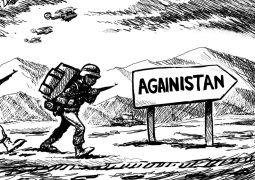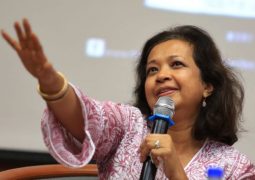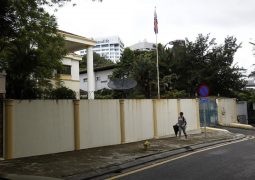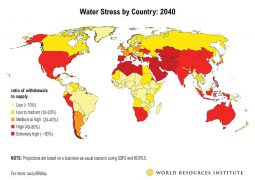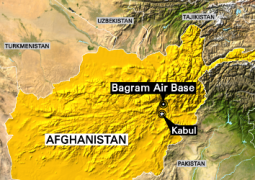Turkey expects improved relations with the Trump administration

Turkey is confident that its relations with the United States will improve significantly under President-elect Donald Trump and expects positive responses to concerns it believes the Obama administration played down, Turkish Foreign Minister Mevlut Cavusoglu said Thursday.
At the top of Turkey’s list of issues, he said in an interview, are its request for U.S. extradition of Fethullah Gulen, the Pennsylvania-based Turkish cleric charged with orchestrating last summer’s coup attempt, and U.S. dependence on and support for Syrian Kurdish fighters that Turkey considers terrorists.
“I am confident that there is definitely a better understanding” of both concerns by Trump, said Cavusoglu, who came for the inauguration and met this week with Michael T. Flynn, the president-elect’s designated national security adviser. “We need to rebuild mutual trust,” he said, noting that “anti-Americanism is on the rise in Turkey.”
Checkpoint newsletter
Military, defense and security at home and abroad.
“We are waiting for the new administration,” Cavusoglu said.
Amid high global anxiety over Trump, Turkey and Russia are among the few nations who are sure that things are about to get much better.
U.S. relations with Turkey, a NATO ally, have slumped under President Obama. Both countries are members of the U.S.-led coalition against the Islamic State and the U.S.-organized international group seeking a solution to Syria’s civil war.
[U.S. military aid is fueling big ambitions for Syria’s leftist Kurdish militia]
But geography — including Turkey’s 500-mile-long border with Syria — and differences between the way Obama and Turkish President Recep Tayyip Erdogan assess the counterterrorism threat have often left them at odds over how to deal with the upheaval in the Middle East.
In recent months, Turkey has turned to Russia to help solve the Syria problem that the United States accuses the Kremlin of fueling with its military and political support for President Bashar al-Assad. The two, along with Iran — Assad’s other ally — have organized a cease-fire and peace conference between the Assad government and its armed opponents, to begin Monday in Astana, Kazakhstan.
Cavusoglu said the conference, part of a process from which the Obama administration was excluded, hopes to solidify the cease-fire, which he said both Assad and Iranian allies have violated, and to initiate direct talks between the sides on the ground prior to United Nations-sponsored peace negotiations in early February.
Trump has promised improved ties with Russia, and Flynn received a personal invitation late last month from Sergey Kislyak, Russia’s ambassador to the United States. Although the incoming administration has not formally replied, Cavusoglu said he is certain that Trump will send a representative.
This week, Turkish and Russian warplanes for the first time flew joint strike missions in support of Turkish troops advancing on Islamic State positions in and around the northern Syrian town of al-Bab. The United States had advised against the al-Bab operation and demurred on requests for direct air support as Turkish ground forces ran into trouble in the area about 30 miles south of its southern border.
“They are using my air base, and they are not giving air cover,” Cavusoglu said of the United States, which launches much of its own air operations against the Islamic State in Syria from Turkey’s Incirlik base. “I’m not cooperating with Russia against NATO allies or anybody else, but against terrorists.” Both Obama and Trump have proposed counterterrorism cooperation with Russia in Syria.
Cavusoglu bristled over widespread reports here and in Europe that Turkey is “tilting” away from NATO and toward Russia.
“Do we have to agree to whatever the U.S. asks or says, since we are allies?” he said. “No. I don’t have to . . . or vice versa.”
“Whenever we have good relations with other countries, this is the typical question — is there a shift or not?” International relations are shifting all the time, he said, as countries follow their own interests. Many of those raising questions about Turkey, he said, have extensive economic and other interests with Russia, despite sanctions imposed following Russian incursions in Ukraine.
“Do I ask those countries whether they have ‘shifted’?” he asked? “This is nonsense. This is unacceptable. . . . How can I say no to any country when it comes to fighting against terrorist organizations?”
Much of Turkey’s ire toward the United States — and of U.S. reluctance to provide direct assistance to Turkey’s operations inside Syria — involves the People’s Protection Units, or YPG, the Syrian Kurdish fighters who form the bulk of the U.S.-backed fighting force against the Islamic State in Syria.
The Pentagon, while acknowledging that the Kurds have a separatist agenda, believes they are the only domestic Syrian force capable of combating the militants and that they can be controlled. It fears that Turkish advances inside Syria eventually will disrupt nearby U.S.-backed operations, spearheaded by YPG forces, to eliminate the Islamic State.
Turkey considers the YPG part of the Kurdistan Workers’ Party, or PKK, the Turkish separatist movement both it and the United States have labeled terrorists. Cavusoglu said that the perpetrators of recent terrorist attacks in Istanbul and Ankara came from YPG camps in Syria and that the United States has made itself a “hostage” to the group.
“One terrorist organization is forcing the policy of a big country like the United States,” he said. “Is it acceptable? No.”
Once they take al-Bab, he said, Turkish forces will turn eastward toward the de facto Islamic State capital of Raqqa, where the United States, the YPG and allied Syrian Arab forces are organizing an offensive for later this year. If Turkey encounters the Kurds, Cavusoglu said, it will fight them.
He said Turkey believes Trump will resolve this problem, in addition to adding “new energy” to the fight against the Islamic State.
Cavusoglu said he also expects an early favorable response from the Trump administration to Turkey’s request for the extradition of Gulen, which was initially transmitted in August. Since then, he said, “we haven’t heard anything” from the Justice Department.
A Justice Department spokesman declined to respond to requests for information about the status of the request.
- Previous Turkmenistan, China celebrate 25th anniversary of establishment of diplomatic relations
- Next OIC calls on Myanmar to end aggression against its Muslim community
You may also like...
Recent Posts
- North Korea’s Hwasong-1 “Guam Killer” ballistic missile is game-changer
- Xi-Putin Lunar Year Call to strengthen limitless strategic Putin
- President of Uzbekistan Shavkat Mirziyoyev paid a state visit to Tajikistan
- President Tokayev meets President Japarov upon arrival in Astana airport
- Iran holds military parade days after massive attack on Israel
- India election: world’s largest democracy votes
- Mount Ruang volcano erupts: Indonesia issues tsunami alert
- Priorities of Australia’s $32 Billion Defence Boost
- ARMAGEDDON TODAY: US-China to field military drone swarms: BIG ARMS RACE IS COMING
- Myawaddy – a town on Myanmar-Thai border falls to anti-govenment KNU forces
Random news
Views
- North Korea’s New Intermediate-Range Ballistic Missile, the Hwasong-12: First Takeaways - 874 views
- Chinese military base in Djibouti necessary to protect key trade routes linking Asia, Africa, the Middle East and Europe - 866 views
- OIC, 57-nation Islamic body calls US travel ban a ‘grave concern’ - 547 views
- Goods from China start to be shipped by train to Europe: Luxembourg-Chengdu freight train route launched - 533 views
- Kyrgyzstan actively working on start of construction of China—Kyrgyzstan—Uzbekistan railroad - 422 views
- Gabbard allies rush to her defense after Assad meeting - 418 views
- Why Indians want to have white skin?! Pakistani authors thoughts. Article: The complexion of a new culture - 417 views
- What is wrong with JATECO Company’s business with Central Asian states!? Why Japanese standards of corporate governance and integrity in doing business are earning bad name with JATECO? - 416 views
- Iran tested medium-range ballistic missile - 416 views
- China: Philippines can’t claim Benham Rise - 406 views
About us

Our Newly established Center for study of Asian Affairs has
branches in Indonesia, Malaysia and Singapore, as well as freelances in some other countries.
For inquires, please contact: newsofasia.info@yahoo.com Mr.Mohd Zarif - Secretary of the Center and administer of the web-site www.newsofasia.net



